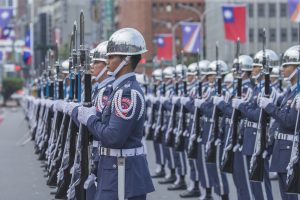In recent years, Taiwan’s remaining official diplomatic partners have dwindled in number and the island’s participation in other diplomatic venues continues to be squeezed. At the same time, Taiwanese President Tsai Ing-wen’s decisive reelection in January 2020 suggests that the island is committed to its democratic system of self-governance despite heightened pressure and antagonism from Beijing.
China’s posturing, including tough rhetoric from leaders such as Xi Jinping, the Chinese Navy’s increased presence in the Taiwan Strait and surrounding waters, as well as targeted military drills, have no doubt led Taiwanese leadership to invest further in the island’s military capabilities. Counterintuitively, might bluster from Beijing push Taipei to reinvigorate defense partnerships with other foreign powers?
For example, last week, Beijing urged Paris to cancel a new weapons contract it had signed with Taiwan, or risk damaging the Sino-French relationship. In April, Taiwan announced an estimated $27 million acquisition from a French defense firm to upgrade decoy launchers for its navy’s Kang Ding-class frigates intended to defend the Taiwan Strait. Although France has not been a source of arms imports to Taiwan in recent years, the European nation and the island do have defense procurement history — notably a deal for frigates in the early 1990s that resulted in political scandal.
France is not alone in having sold arms to Taiwan. According to the Stockholm International Peace Research Institute (SIPRI), Taiwan has been the recipient of arms exports from a dozen of countries since 1950 (Canada, Denmark, France, Germany, Israel, Italy, Japan, Netherlands, Singapore, Switzerland, United Kingdom, and the United States). Still, the U.S.-Taiwan defense relationship far exceeds the others both in value and in consistency. The United States has exported weapons to Taiwan annually for more than 70 years (with the exceptions of 1950 and 2009). Since 2008, the United States has sold more than $24 billion in arms to Taiwan, including fighter aircraft, tanks, and missiles.
Few arms deals were struck between Taiwan and other foreign powers in the more than two decades between the end of World War II and Beijing’s replacement of Taipei as the official “China” representative within established international institutions. Still, during the late 1980s and 1990s amid international backlash against Beijing for the 1989 Tiananmen violence and the Third Taiwan Strait Crisis, Taiwanese foreign arms procurement partnerships reached their peak in diversity, though the value of the contracts has since picked up.
For its part, the French military, under President Emmanuel Macron’s leadership, has increased its passage through waters in the Asia-Pacific with naval vessels transiting near islands in the South China Sea and through the Taiwan Strait. The latest French contract is also likely part of a larger effort by Taiwan under the leadership of Tsai Ing-wen to boost the island’s defenses. In her reelection victory speech earlier this year, Tsai said, “In the face of China’s intention to unilaterally change the cross-strait status quo, Taiwan has had no choice but to continue strengthening our democratic defense mechanisms, and establish national defense capabilities that can ensure security in the Taiwan Strait.”
Last year, Taiwan announced plans to steadily up its defense budget over the next decade. Defense spending totaled $11.34 billion in 2019, up 5.6 percent the previous year, and is expected to surpass $13 billion by 2027. Taiwan’s government also has plans to develop indigenous training jets, submarines, and other weapons technology to supplement its foreign arms purchases.
Comparatively, the People’s Republic of China’s defense spending grew to 1.2 trillion yuan (nearly $178 billion) last year, ranking second in defense budgets worldwide after the United States. Beijing’s 2019 budget is up from more than 530 billion yuan in 2010, according to data in its latest defense white paper. The white paper also states that “‘Taiwan independence’ separatist forces and their actions remain the gravest immediate threat to peace and stability in the Taiwan Strait and the biggest barrier hindering the peaceful reunification of the country.”
As such, much of China’s military modernization is targeted at Taiwan Strait contingencies and plans to retake the island. Beijing is also rumored to be planning a military exercise late this summer simulating the seizure of Taiwan-controlled Pratas Island. Despite Beijing’s recent provocations, there is no consensus among experts on what the future of cross-strait relations may be. Some argue that Beijing’s coercion may push Taiwan further toward independence, while others claim that the risk for military action remains low.
And yet, as Taiwan continues to take steps to bolster its security, some question the logic behind the actual weapons purchased. Tanner Greer highlighted that the acquisition of fancy military equipment may not make sense in its defense calculus in the face of threats from the mainland but instead serves other, more political purposes: “raising Taiwan’s stature on the international stage” and showing that its military remains a “world-class fighting force.”
Taipei, cautious of being caught between heightened Beijing-Washington tensions, may look elsewhere to reduce its overreliance on arms sales from the United States. Still, the island’s allocation of spending for weapons purchases and development may continue to raise questions about its defense strategy. Separately, it remains to be seen whether foreign powers, many of whom have strong economic ties to Beijing, will be willing to engage in defense deals with Taipei and at what costs.













